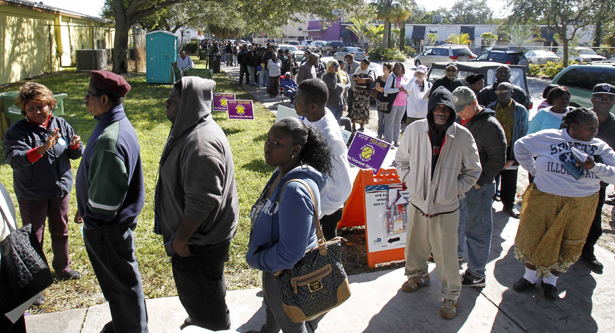
Voters stand in line in North Miami, October 30, 2012. (AP Photo/Alan Diaz)
Supreme Court Justice Antonin Scalia made a point of emphasizing during the Bush v. Gore arguments in December 2000 that there is no federal constitutional guarantee of a right to vote for president. Scalia was right. Indeed, as the reform group FairVote reminds us, “Because there is no right to vote in the U.S. Constitution, individual states set their own electoral policies and procedures. This leads to confusing and sometimes contradictory policies regarding ballot design, polling hours, voting equipment, voter registration requirements, and ex-felon voting rights. As a result, our electoral system is divided into 50 states, more than 3,000 counties and approximately 13,000 voting districts, all separate and unequal.”
Mark Pocan and Keith Ellison want to do something about that.
The two congressmen, both former state legislators with long histories of engagement with voting-rights issues, on Monday unveiled a proposal to explicitly guarantee the right to vote in the Constitution.
“The right to vote is too important to be left unprotected,” explained Pocan, who announced the initiative at the state capitol in Madison, Wisconsin, where the Republican state assembly speaker recently announced plans to enact restrictive “voter ID” legislation before the 2014 election. “At a time when there are far too many efforts to disenfranchise Americans, a voting rights amendment would positively affirm our founding principle that our country is at its strongest when everyone participates. As the world’s leading democracy, we must demand of ourselves what we demand of others—a guaranteed right to vote for all.”
Without that clear guarantee, argues Ellison, politicians continue to propose and enact legislation that impedes voting rights. Noting recent wrangling over voter identification laws, burdensome registration requirements and reduced early voting opportunities in various states, as well as a challenge to the Voting Rights Act that is now under consideration by the US Supreme Court, the Minnesota Democrat, who co-chairs the Congressional Progressive Caucus, says, “Even though the right to vote is the most-mentioned right in the Constitution, legislatures across the country have been trying to deny that right to millions of Americans, including in my home state of Minnesota. It’s time we made it clear once and for all: every citizen in the United States has a fundamental right to vote.”
Popular
"swipe left below to view more authors"Swipe →
If approved by the Congress and then ratified by three-fourths of the states, it would add to the founding document this declaration:
SECTION 1: Every citizen of the United States, who is of legal voting age, shall have the fundamental right to vote in any public election held in the jurisdiction in which the citizen resides.
SECTION 2: Congress shall have the power to enforce and implement this article by appropriate legislation.
There is nothing radical about that language. It outlines a basic premise of the American experiment, and a concept that the United States has proudly exported. Indeed, when the US has had a hand in shaping the destinies of other lands, as well as international agreements, the primacy of the right to vote has been well understood and explicitly stated.
The constitution of Iraq guarantees that “Iraqi citizens, men and women, shall have the right to participate in public affairs and to enjoy political rights including the right to vote, elect, and run for office.”
In Afghanistan, the constitution provides every citizen with “the right to elect and be elected.”
The German constitution crafted in the aftermath of World War II declared that every adult “shall be entitled to vote.”
In Japan, the constitution announced, “Universal adult suffrage is guaranteed.”
And, of course, when former first lady Eleanor Roosevelt chaired the commission that outlined a Universal Declaration of Human Rights, the document declared:
1. Everyone has the right to take part in the government of his country, directly or through freely chosen representatives.
2. Everyone has the right of equal access to public service in his country.
3. The will of the people shall be the basis of the authority of government; this will shall be expressed in periodic and genuine elections which shall be by universal and equal suffrage and shall be held by secret vote or by equivalent free voting procedures.
Americans have considered right-to-vote amendments in the past. But the frequency with which contentious debates are erupting nationwide—just this year, according to the Brennan Center for Justice, more than eighty bills to restrict voting have been introduced in more than thirty states—has already inspired significant activism on behalf of constitutional reform.
“The right to vote is the foundation of any democracy,” says FairVote executive director Rob Richie. “Adding an affirmative right to vote to the US Constitution is the best way to guarantee that the government, whether at the federal, state, or local level, cannot infringe upon our individual right to vote. Building support for this amendment offers an opportunity to inspire a twenty-first-century suffrage movement where Americans come together to protect voting rights, promote voter participation and debate suffrage expansion.”
John Nichols is the author (with Robert w. McChesney) of the upcoming book Dollarocracy: How the Money and Media Election Complex is Destroying America. Hailed by Publisher’s Weekly as “a fervent call to action for reformers,” it examines a host of voting rights and democracy issues—including the case for a right-to-vote amendment to the Constitution.


